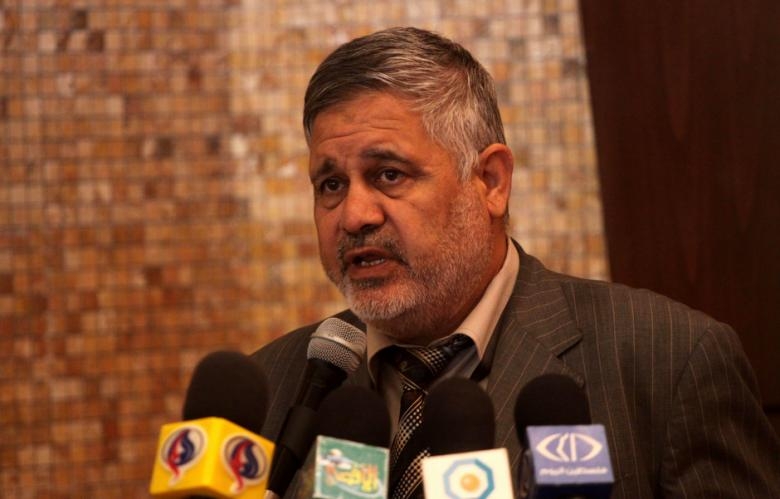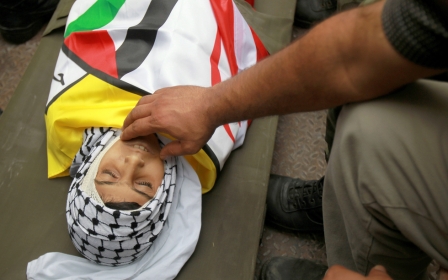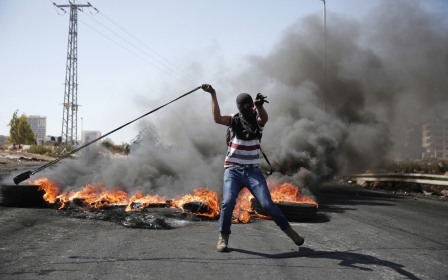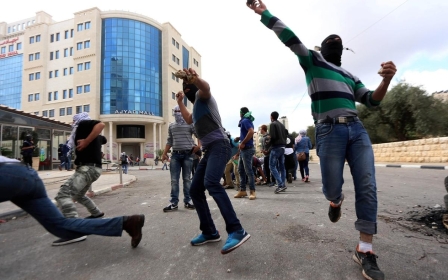A new Palestinian leader will emerge from a new intifada, says top Hamas member

The leader of a new intifada will come from among Palestinian youth currently leading popular unrest across Israel and the Occupied Palestinian Territories, a senior member of Hamas has told Middle East Eye.
“The youth is leading everybody at the moment, with no particular person in charge,” said Ahmed Yousef, a former political advisor to the deputy chair of Hamas’ political bureau Ismail Haniyeh.
“I believe that once this [popular unrest] has grown into an intifada they will find someone among the youth who will create a name for themselves. The [Palestinian] people will follow whoever that is and everybody will join from all the political factions.”
Yousef is seen by Hamas as a gateway to the West and regularly receives international delegations in Gaza. He spent many years living in the United States before returning to Gaza in 2005, following Israeli withdrawal from the Palestinian enclave.
The 65-year-old is now head of the Palestinian Institute for Conflict Resolution and Governance in Gaza, after serving Hamas in numerous senior positions and remains an influential figure within the movement.
Speaking to MEE by phone on Thursday, Yousef urged Palestinians not be “stuck in the mindset” of looking for leadership from the current crop of politicians. He said it was time for the younger generation of Palestinians to take control of the struggle for statehood.
While many commentators have described violence gripping Israel and Palestine – 50 Palestinians and eight Israelis have been killed in October – as the beginning of a new intifada, Yousef said it was still too early to declare a third Palestinian uprising.
The last intifada, which lasted for five years and ended in 2005, saw the deaths of over 3,000 Palestinians and more than 1,000 Israelis.
'Three stages' to an intifada
Yousef argued that there were three stages that must be completed before an intifada could be said to have begun.
“Now we have popular unrest – this is stage one,” he said. “Maybe after a couple of months, if more people get involved, it will spread more inside [Israel] and we will move to stage two. The second stage will be when all the political factions will be part of it and organise it.”
“The third stage is finding a leader – someone who can represent all the factions, nationalist and Islamist groups. This person needs to be able to articulate a vision for what we would like to achieve out of an intifada.”
Yousef has a long history of being an independent voice within Hamas. His view that an intifada has not started goes against other senior members, who as recently as 20 October declared the start of a new uprising.
The latest spike in violence has seen numerous knife attacks by Palestinians against Israelis. While some elements of Hamas have expressed support for knife attacks, Yousef said “this is not a Hamas tactic”.
He did not criticise knifings, however, and instead sought to explain the political and social context that he believes is causing them.
“What we are seeing are desperate, humiliated people using the only tool available to them,” he said. “They don’t have any other means to defend themselves. There have been many non-violent initiatives for years but perhaps this hasn’t been very effective.
“Perhaps the only thing Palestinians have been left with is a knife, a digger, a car. These attacks are a message to the international community that ‘We are the Palestinians still suffering occupation and we need the world to do something’.”
Videos of Palestinians attacking Israelis with knives have brought widespread condemnation. It comes after international support for the Palestinian cause soared in the wake of Israel’s brutal assault on the Gaza Strip last summer.
Yousef was unconcerned that knife attacks may negatively impact Palestinian image in the international community. He said that social media had allowed people to gain independent insight into the conflict in a way not possible in the past.
Social media 'breaking down barriers'
“The Israelis are used to controlling the narrative of the conflict,” he said “Today social media breaks down the barriers and people are able to hear the Palestinian narrative. I do believe people understand the level of suffering we are going through.”
Viral videos of Palestinian attacks have been matched by ones carried out by Israelis, including footage of a recent mob attack on an Eritrean asylum seeker.
Yousef said the latest unrest was sparked by Israeli settler violence, pointing to the attack on a Palestinian home in the West Bank that saw a toddler burned to death.
He argued that a third intifada could be avoided if Israel “disciplined the settlers and genuinely sought to find a political solution to the conflict”. He called on the international community to intervene and “tell Israel enough is enough and the Palestinians should have their own state”.
Yousef warned that in Gaza, which Hamas has ruled since 2006, an unemployment rate of over 60 percent among young people was turning the enclave into a “pressure cooker” of frustration that was ready to burst.
“Hamas can’t do that much for the people, as long as there is occupation and siege,” he said. “We can’t do anything to serve this new generation to make their lives better.”
Yousef said he was not worried Palestinians in Gaza would turn their anger against Hamas, arguing that locals “know it is Israel who is behind their suffering”.
“The people are angry with the Palestinian Authority too, who have not done anything to improve the lives of people in Gaza. They are also angry at Egypt – they think that Egypt is also part of the problem,” he said, referring to how Cairo has maintained a blockade on Gaza in conjunction with Israel.
Amid a range of problems facing Gaza, in recent months the Islamic State group appears to have emerged in the enclave, claiming a spate of rocket and car bomb attacks.
Yousef said that the ability for IS to recruit Palestinians was down to the Israeli siege on Gaza.
“It is easier for these people to recruit when there are no jobs. This makes it possible for them to brainwash the people in a very negative way,” he said.
However, Yousef was unconcerned by the IS threat, which he said was being handled by Hamas.
“[IS] is here [in Gaza] but they are limited in number,” he said. “These people [IS] are still under control - they know the wrath of Hamas.
“I don’t think any of them will dare to do anything other than maybe firing the occasional rocket to give the impression they are there. I don’t think they can do anything to harm the stability and security of Gaza.”
New MEE newsletter: Jerusalem Dispatch
Sign up to get the latest insights and analysis on Israel-Palestine, alongside Turkey Unpacked and other MEE newsletters
Middle East Eye delivers independent and unrivalled coverage and analysis of the Middle East, North Africa and beyond. To learn more about republishing this content and the associated fees, please fill out this form. More about MEE can be found here.




